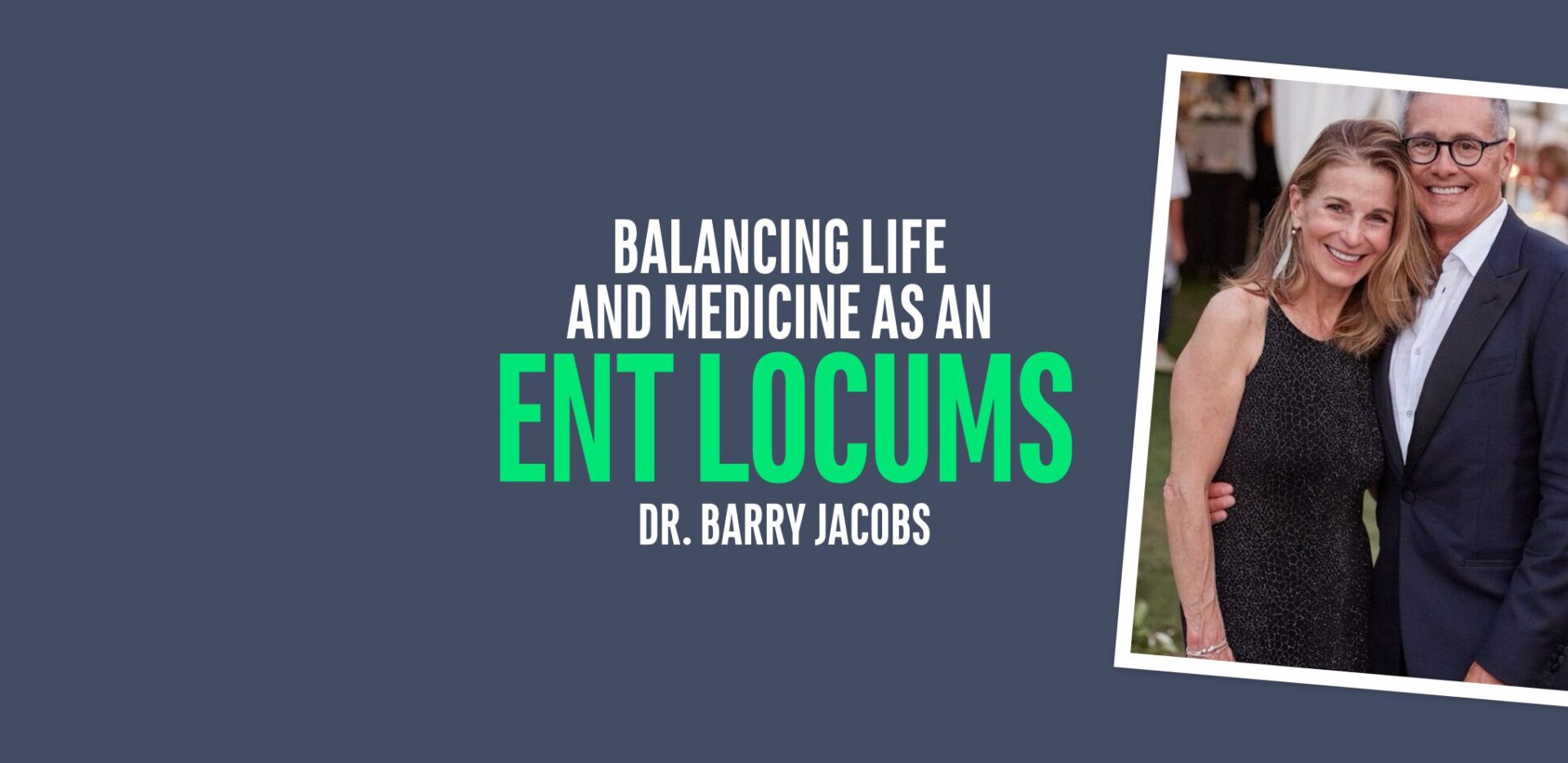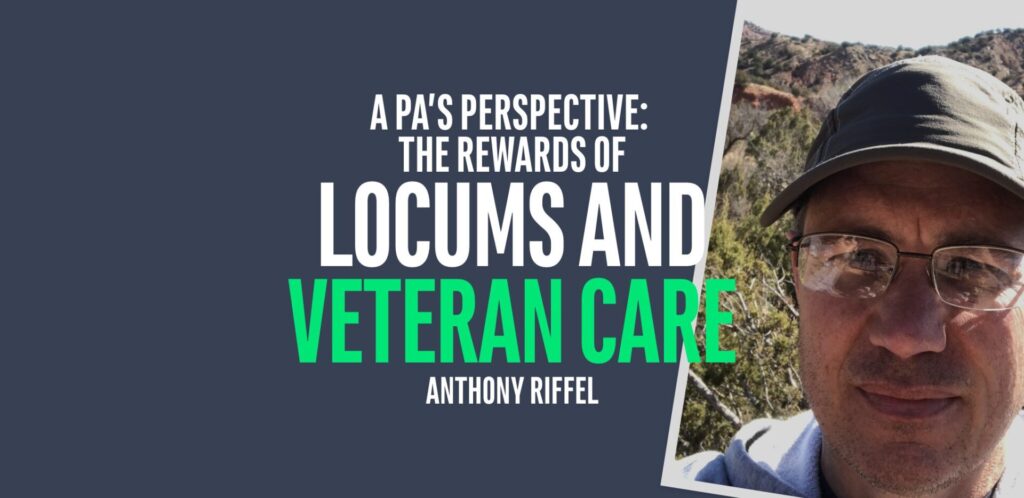One of the benefits of locum tenens is that it can be a great way of transitioning from full-time practice to whatever your next chapter will look like.
Dr. Barry Jacobs is a great example. After building a successful ENT practice, he decided to retire early to have more time to spend with his family. He was able to partner with his locums consultant and create a job that worked for him: allowing him to spend one week per month working in a location close to his children and grandchildren, while also having time to spend with his wife enjoying their semi-retirement in Cape Cod and Naples, Florida.
Here’s what he had to say:
Tell us a little bit about your experience as a locums ENT.
When I joined my practice in 1991, it was a single-specialty group with two other people. By the time I left years later, we had five partners, two employed physicians, four PAs, six audiologists, an allergy department, a CT scan––and I was a managing partner.
During that time, I built a great practice. But running a practice can be obnoxious: the meetings, the finances, the contracting, the HR––all of those issues started wearing on me. I also was really involved with the hospital, as the president of the PHO and the IPA and the Contracting Committee, at one point or another. So I was doing a lot of things that I loved doing––until I didn’t want to anymore.
From a personal perspective, part of why I left my practice is that we lost my dad really, really young. So I always felt that I was on a clock; I only had so much time in this world. And I loved what I did, but I also have a great wife and an amazing family.
My wife and I discussed this, and she said, we’ve made money––she was very successful and her line of work as well––but you can’t find more time. And she asked me how I felt about getting out a little bit earlier.
So that’s what I did. I left the practice after 30 years. But I’m still young, and it was a strange feeling leaving full time practice, so locums answered a lot of things for me.
Locums kept me busy, kept my surgical skills and my mind going––but on my schedule, and my wife’s schedule, and without the demands of running an office. It’s been an amazing transition from going 1,000 miles an hour to 55 on the highway, just taking it easy. Locums has kept me engaged and feeling relevant without feeling overburdened.
We hear often that the administrative burden is what drives people to locums. But what’s unique about your experience is how your unique life experience dictated your outlook and priorities.
That’s very true. I mean, I loved what I did, and I was good at it. I loved being involved, being busy, and managing things. So me just getting tired of work was not the impetus for this transition at all. If I just wanted to stop working, I would have just quit and done nothing at all.
My dad died at 48. I was 23 years old, in my first year of medical school. So I thought that when I hit 48, I was going to be dead. And then, 10 years later, I was healthy and still going, and I thought, okay, I’ve outlived when I thought I was going to live to. And I’m going to just tell my group, after 30 years of practice, I’m done.
It was a great decision. And the way I did it helped me set the group up for success––I didn’t just leave, I helped them hire a new part-time ENT, and took the time to transition. And it was the same with my responsibilities in the hospital. It was a comfortable transition.
How often are you working as an ENT locums now? What does that balance look like?
Hayes Locums is the only company I’m working with currently. When I first left the group, the woman we hired wasn’t ready to come in for a few months, so I stayed on part time––two weeks on, two weeks off. I did that for about six months. And then I did about six months with another locums company.
But I’ve found that the right amount for me is one week on each month. So that’s what I’m doing for Hayes now. As it turns out, I’ve done a little bit more because they were short-staffed and they asked, and I can’t say no [laughs]. But the right fit for me and for my wife and for our kids and grandchildren is one week on, and then three weeks off.
I was very clear with my consultant, Hunter, about what my desires were for the optimal job. So when he found a pediatric ENT position––which is my specialty––at a Children’s Hospital in my preferred geographic location, he reached out to me. And it turned out to be a great fit.
The job is only a couple of hours from my children and grandchildren.. On my way into my job, my wife and I will go and visit with the kids and the grandkids and hang out, and then I’ll get in my car and go work for a week. Once a month, I get to see the kids and go to work, and then for three weeks, I get to play.
What was your experience like working with Hayes Locums?
My consultant, Hunter, is great. He didn’t waste my time. He didn’t blow smoke. He respected my time, and my desires. I was very specific on geography––I told him not to call me if it’s not within driving distance of Chicago, and he found me a great fit.
He’s also very responsive––if I reach out, I always get a response. He never blows me off. And he has a great team. Keeley, his assignment coordinator, was unbelievable, and made all the logistics so much more enjoyable and easy.
What are you doing with your free time, now that you’re only working part-time?
We are living the dream. I do two activities a day: cycling and pickleball, or pickleball and golf, or when it rains, working out at the gym and then hanging out with my wife. It’s a healthy lifestyle, both physically and emotionally.
We’re super thankful. My practice did well, my wife owned her own business and sold it and she did amazingly well. We don’t have the most and we don’t have the least, but we’re very comfortable.
How busy are you as in your ENT locums job?
People don’t do locums after a full time practice if you don’t like being busy. There are people that just do it for the money and want to make the most for the least amount of work––but that is contrary to who I am.
I’m not doing this for a paycheck. Don’t get me wrong, I like it. It’s keeping me from dipping into my retirement funds. But that’s not why I’m doing it. I’m doing it because I like to stay active. My preference is to be busy. And I want the people I’m working for to feel like their patients are being well-cared for.
Where I’m working now, they have a huge surgical backlog. So I’m probably in the operating room 80% of the time, maybe even maybe even 90%. For a surgeon, that’s a dream. I couldn’t plan it any better.
Do you have any goals or aspirations for your continued ENT career?
I’m not at the stage of my career where I’m going to reach new pinnacles. I’m not going to publish more papers, I’m not going to come up with new techniques. My outlook is to keep supplying good care until the day that it’s not fun anymore, or until it doesn’t work for my wife, or children and grandchildren. When it doesn’t work, and it’s not fun, that’s when I’ll stop.
What is your advice to other ENTs considering locums?
My advice is: do it for the right reasons. There are two kinds of doctors that do this work [for reasons I wouldn’t recommend]: some doctors need the money and do it from a financial perspective, which I don’t think is the right rationale, and then there are also senior doctors that can’t give it up even though they should, which isn’t a great reason, either.
Locums can be a great transition, because nobody practices half speed. We all go full speed, and there comes a time you can’t go full speed anymore, or shouldn’t. And whenever that is, locums can be a great way to transition to whatever your next chapter may be.
Practicing locums helps maintain our identity and our value. We’ve studied and practiced so long to become really good at what we do. So locums is a good way to ease out of it, and help people at the same time.
That’s my advice: do it for the right reasons. Because you won’t like it if you’re doing it for the wrong reasons.
*This interview has been edited for clarity and length.



